Related Research Articles
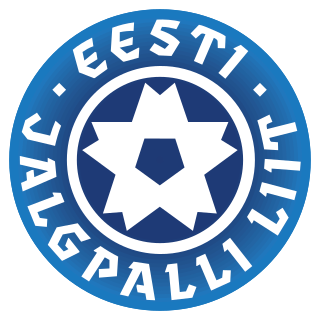
The Estonia men's national football team represents Estonia in international football matches and is controlled by the Estonian Football Association, the governing body for football in Estonia. Estonia's home ground is Lilleküla Stadium in the capital city Tallinn.

Indrek Zelinski is an Estonian football coach and former professional player.
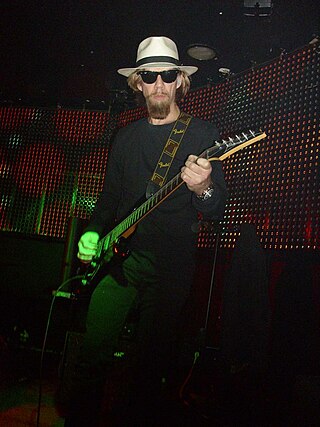
Paul Indrek Kostabi is an American visual artist, musician, record producer and audio engineer. He is the brother of the visual artist and musician Mark Kostabi.
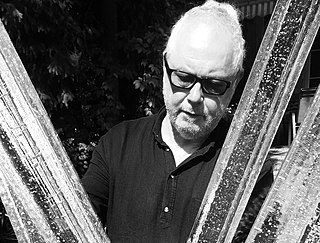
Ivo Lill was an Estonian glass artist.
An election for Members of the European Parliament from Estonia to the European Parliament was held on 7 June 2009.

The 1997 season was the sixth full year of competitive football (soccer) in Estonia since gaining independence from the Soviet Union on 20 August 1991.

Indrek Tarand is an Estonian politician and a former Member of the European Parliament (MEP) from Estonia. He was an independent politician, but a member of the European Green Party.
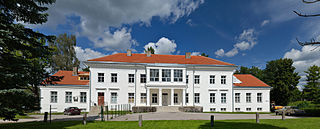
Kohila is a borough in Rapla County, northern Estonia. It is the administrative center of Kohila Parish. Kohila has a population of 3,505.
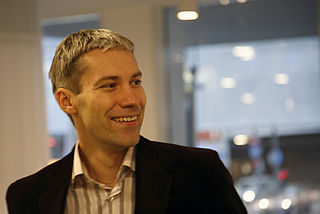
Indrek Allmann is an Estonian architect and city planner.
Jaak Huimerind is an Estonian architect.
Emil Urbel is an Estonian architect.
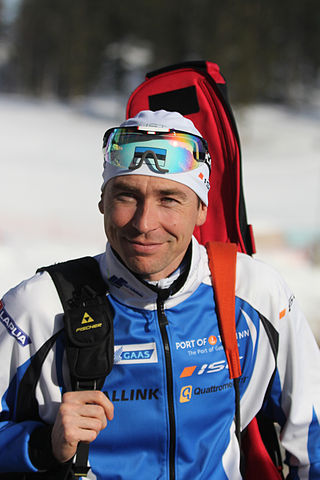
Indrek Tobreluts is an Estonian former biathlete and cross-country skier. He has competed at five Winter Olympics.
Alfred Hirv was an Estonian painter, known especially for his still lifes. For a time he studied with Julius von Klever in Saint Petersburg; further studies took him to Rome and Munich, where he studied at the school of Anton Ažbe. His paintings are reminiscent of the style of the Dutch Golden Age. Works by Hirv can be found in the Art Museum of Estonia.
Estonia participated in the Eurovision Song Contest 2011 with the song "Rockefeller Street" written by Sven Lõhmus. The song was performed by Getter Jaani. The Estonian broadcaster Eesti Rahvusringhääling (ERR) organised the national final Eesti Laul 2011 in order to select the Estonian entry for the 2011 contest in Düsseldorf, Germany. The national final consisted of three shows: two semi-finals and a final. Ten songs competed in each semi-final and the top five from each semi-final as determined by a jury panel and public vote qualified to the final. In the final, the winner was selected over two rounds of voting. In the first round, a jury panel and a public vote selected the top two to qualify to the superfinal. In the superfinal, "Rockefeller Street" performed by Getter Jaani was selected as the winner entirely by a public vote.
Indrek is an Estonian masculine given name. It is the Estonian form of Henry and may refer to:

Liis Koger is an Estonian painter and poet based in Tallinn.

The Tartu Art Museum is a state-owned museum of art located in Tartu, Estonia. It was founded in 1940 on a private initiative by the members of local art school Pallas. This is the largest art museum in Southern Estonia.

Indrek Saar is an Estonian actor and politician. He has been the leader of the Social Democratic Party from 2019 to 2022 and the Minister of Culture of Estonia from 2015 to 2019.
Helmut(h) Tarand was an Estonian poet, philologist, philosopher and cultural figure. He used also pseudonyms Annus Rävälä and Aili Helm.
References
- 1 2 3 4 Vabar, Sven. "Indrek Hirv". sisu.ut.ee. Retrieved 14 January 2021.